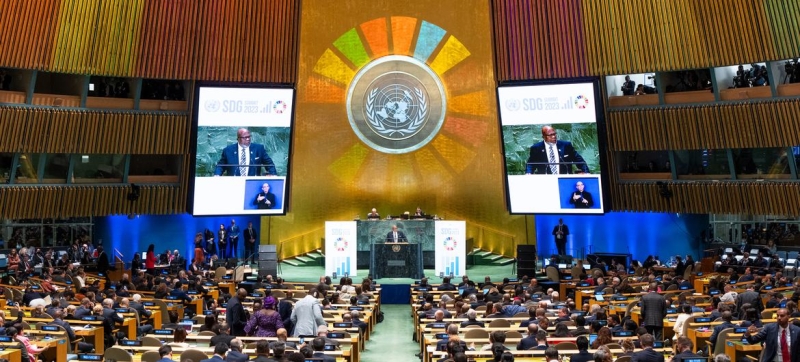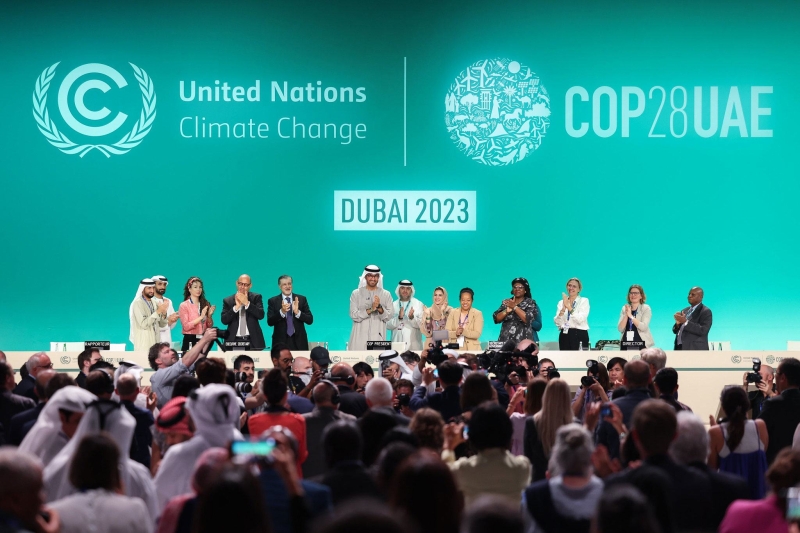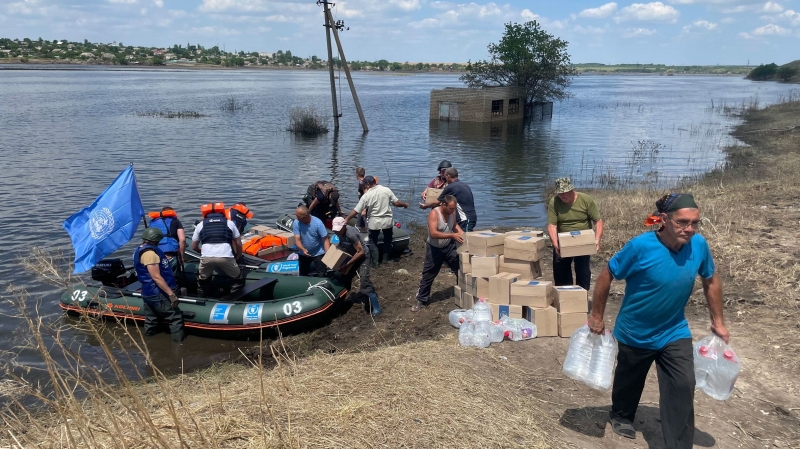
The SDG Summit was held at UN Headquarters in 2023. The Secretary-General reported to Member States on the work of the UN over the past year UN
Conflicts in Gaza, Sudan, Ukraine and elsewhere have resulted in loss of life, the destruction of livelihoods and the displacement of millions of people, putting UN operations under severe pressure in 2023. This is stated in the report of the Secretary-General on UN activities for 2023.
The document prepared for the 79th session of the UN General Assembly sums up the results of the world organization’s work last year in key areas.
Support for peace and security
In 2023, the UN was working in a variety of conflict zones. The world’s attention was focused on Gaza, Ukraine, and Sudan, where fighting threatened regional and international security. In turn, the Secretary-General proposed a “New Agenda for Peace”, calling on states to take multilateral action and build trust.
More than 76,000 UN peacekeepers worked daily to protect civilians in hotspots, including the Democratic Republic of the Congo, Lebanon, the Central African Republic, South Sudan, and Abyei. In 2023, the UN organized the orderly withdrawal of more than 13,000 personnel from the Multidimensional Integrated Stabilization Mission in Mali (MINUSMA) and the handover of its bases and assets amid deteriorating security.
Regarding the situation in Gaza, since October 2023, the UN chief has been actively calling for an end to hostilities and the release of hostages. He also invoked Article 99 of the UN Charter for the first time to draw the attention of the Security Council to the situation in Gaza and Israel, stressing the need for an immediate ceasefire.
Sustainable Development Goals (SDGs)
According to the report, only 17 percent of the SDGs are on track to be met by the deadline. The main problems highlighted by the UN chief are rising poverty, climate change, and the debt crisis of developing countries.
At the 2023 SDG Summit, the UN called on world leaders to commit $500 billion annually to support the implementation of the global goals. This includes measures to reform the international financial system to help developing countries invest in a sustainable future.
The UN offers innovative financial instruments such as debt swaps, which allow countries to exchange part of their debt for investments in sustainable development. This helps developing countries free up resources to achieve the SDGs. The report mentions the SDG Pool, which is assessing the use of debt swaps for development with Portugal and Sao Tome and Principe.
Climate Action
2023 was marked as the hottest year on record. Emergencies such as rising sea levels, extreme weather events and biodiversity loss threatened vulnerable populations.

COP28 participants in Dubai approved a roadmap for the “transition from fossil fuels”.
At the UN Climate Summit (COP28) in Dubai, more than 72 governments signed commitments to work with subnational governments to develop and implement climate strategies. A new fund was also launched to compensate countries affected by climate-related disasters such as floods and hurricanes for damage and losses.
The UN also launched a global coalition to reduce methane emissions, which has been joined by more than 50 countries. Under this initiative, countries have committed to reducing methane emissions by 30 percent by 2030.
Human Rights
The UN continued its work to protect the rights of all inhabitants of the planet, including women, children, persons with disabilities, and indigenous peoples. The UN actively supported the work of 3,530 youth organizations and interacted with 1,894 organizations working on women’s rights issues, providing them with platforms for participation in global forums.
Through the Spotlight Initiative, the UN raised $545 million to combat gender-based violence. This helped strengthen national action plans to prevent gender-based violence and improve women’s and girls’ access to services in 30 countries.
Humanitarian Assistance
The UN coordinated humanitarian plans to help 245 million people in 74 countries and territories. These plans included food, health care, water, sanitation, shelter and protection.
UN agencies provided life-saving assistance to almost 160 million people, despite serious funding shortfalls. Support was provided to people in Afghanistan, Morocco, Libya, Yemen and Syria. However, donors provided $22.7 billion, which covered only 40 percent of the $56.1 billion needed to carry out all humanitarian operations in disaster zones.

UN workers delivered humanitarian aid to residents of a Ukrainian village near the front line. Photo from the archive
In protracted crises, the UN coordinated assistance for more than 27 million people in Afghanistan and 11 million people in Ukraine. The organization also supported responses to new or escalating crises, such as in Sudan, where the UN supported 8 million people. UN coordination and response efforts made a significant contribution to alleviating the suffering of millions of people in Yemen and the Horn of Africa. The organization also supported the global response to devastating earthquakes in Morocco, the Syrian Arab Republic and Turkey, and cholera outbreaks and floods in Libya, Malawi and Mozambique.
The UN actively supported an initiative for the safe transportation of grain and food from Ukrainian ports, which continued throughout much of 2023. The initiative has played a key role in stabilizing global food prices despite the ongoing conflict.
Read also:
EXPLAINED | Humanitarian aid – or lack thereof – in Gaza
Since October 2023, more than 200 UN staff members working in Gaza have died, marking the highest loss of life of humanitarian workers in the organization’s history. The UN continued to deliver aid to the people of Gaza despite dangerous conditions.
International Law
The International Court of Justice heard a number of high-profile cases and issued decisions, including the case of Ukraine v. the Russian Federation concerning the application of the International Convention for the Suppression of the Financing of Terrorism and the International Convention on the Elimination of All Forms of Racial Discrimination.
The Court also had five new contentious cases pending before it, including Application of the Convention against Torture and Other Cruel, Inhuman or Degrading Treatment or Punishment (Canada and the Netherlands v. Syrian Arab Republic) and Application in the Gaza Strip of the Convention on the Prevention and Punishment of the Crime of Genocide (South Africa v. Israel). In both cases, the Court ordered provisional measures.
The UN Secretariat provided the Court with documentation that helped to answer questions posed by the General Assembly in its requests for advisory opinions on the legal consequences of Israeli policies and practices in the Occupied Palestinian Territory, including East Jerusalem, and on the responsibilities of States in relation to climate change.
